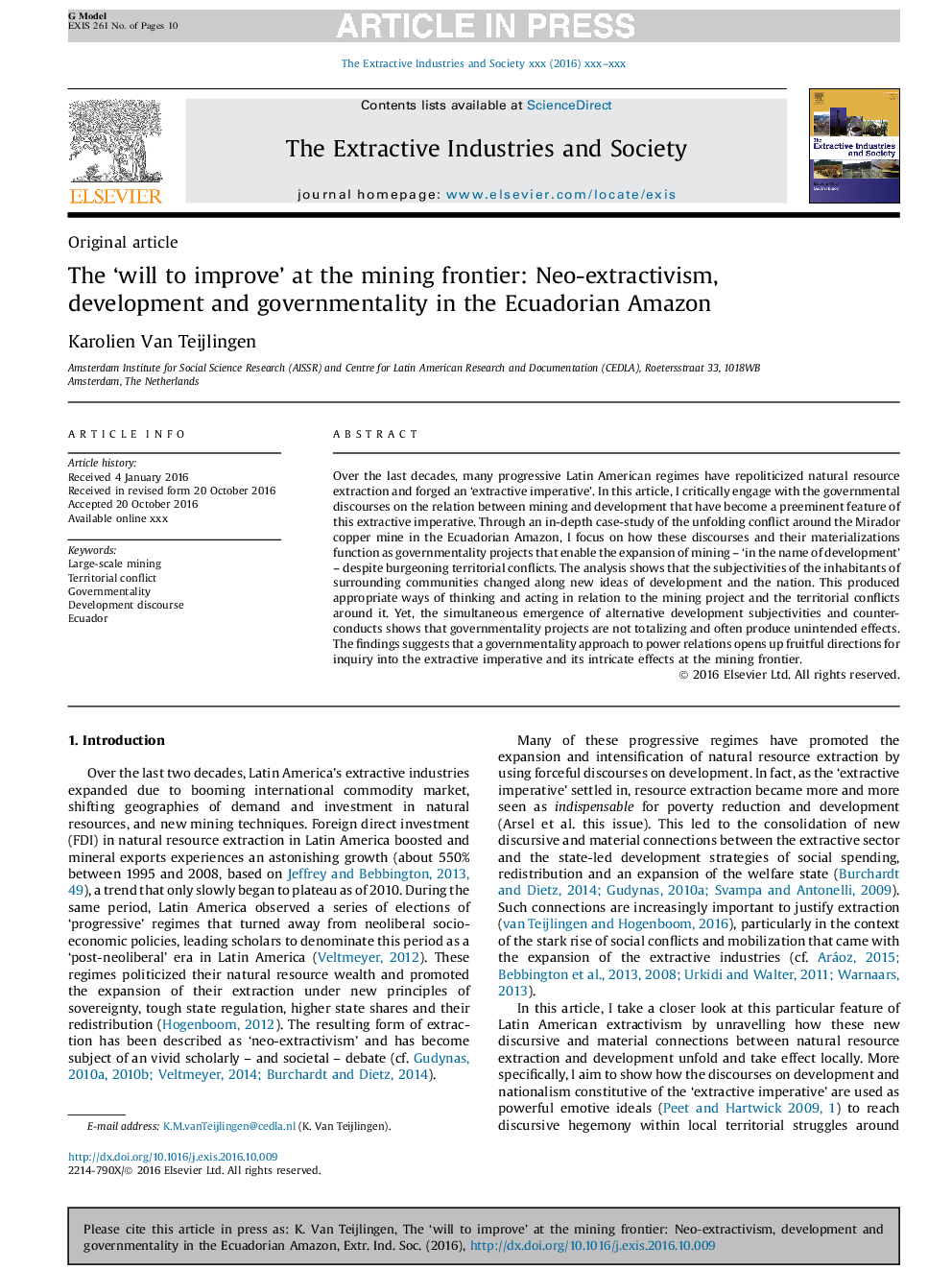| کد مقاله | کد نشریه | سال انتشار | مقاله انگلیسی | نسخه تمام متن |
|---|---|---|---|---|
| 5114417 | 1377991 | 2016 | 10 صفحه PDF | دانلود رایگان |
عنوان انگلیسی مقاله ISI
The 'will to improve' at the mining frontier: Neo-extractivism, development and governmentality in the Ecuadorian Amazon
ترجمه فارسی عنوان
"قصد بهبود" در مرزهای معدن: غیر انحصاری، توسعه و حکومتداری در آمازون اکوادور
دانلود مقاله + سفارش ترجمه
دانلود مقاله ISI انگلیسی
رایگان برای ایرانیان
کلمات کلیدی
معدنکاری بزرگ، درگیری قلمروی، حکومتداری، گفتمان توسعه، اکوادور،
ترجمه چکیده
در دهه های گذشته، بسیاری از رژیم های مترقی رژیم های آمریکای لاتین، استخراج منابع طبیعی را مجددا مجبور کرده اند و "ضرورت استخراج" را جعل کرده اند. در این مقاله، من به شدت با گفتمان های دولتی درباره رابطه بین معادن و توسعه، که یکی از مهمترین ویژگی های این ضرورت استخراج شده است، شرکت می کنم. از طریق بررسی دقیق مورد مناقشه در حال ظهور در معدن مس میرادور در آمازون اکوادور، من بر این موضوع تمرکز می کنم که چگونه این گفتمان ها و تحرکات آنها به عنوان پروژه های حکومتی که قادر به توسعه معدن می باشند - به نام توسعه " با وجود شکاف های سرزمینی رو به رو شد. تجزیه و تحلیل نشان می دهد که ذهنیت ساکنان جوامع اطراف با ایده های جدید توسعه و ملت تغییر یافته است. این روش های مناسب برای تفکر و عمل در رابطه با پروژه معدن و درگیری های سرزمینی اطراف آن را تولید می کند. با این حال، ظهور همزمان فاکتورهای توسعه جایگزین و مخالفان نشان می دهد که پروژه های دولتی تمام نشده و اغلب اثرات ناخواسته ای را ایجاد می کنند. یافته های این تحقیق نشان می دهد که رویکرد حکومتی برای روابط قدرت، راه های پربار برای تحقیق در مورد ضرورت استخراج و اثرات پیچیده آن در مرزهای معدنی را باز می کند.
موضوعات مرتبط
علوم زیستی و بیوفناوری
علوم محیط زیست
مدیریت، نظارت، سیاست و حقوق
چکیده انگلیسی
Over the last decades, many progressive Latin American regimes have repoliticized natural resource extraction and forged an 'extractive imperative'. In this article, I critically engage with the governmental discourses on the relation between mining and development that have become a preeminent feature of this extractive imperative. Through an in-depth case-study of the unfolding conflict around the Mirador copper mine in the Ecuadorian Amazon, I focus on how these discourses and their materializations function as governmentality projects that enable the expansion of mining - 'in the name of development' - despite burgeoning territorial conflicts. The analysis shows that the subjectivities of the inhabitants of surrounding communities changed along new ideas of development and the nation. This produced appropriate ways of thinking and acting in relation to the mining project and the territorial conflicts around it. Yet, the simultaneous emergence of alternative development subjectivities and counter-conducts shows that governmentality projects are not totalizing and often produce unintended effects. The findings suggests that a governmentality approach to power relations opens up fruitful directions for inquiry into the extractive imperative and its intricate effects at the mining frontier.
ناشر
Database: Elsevier - ScienceDirect (ساینس دایرکت)
Journal: The Extractive Industries and Society - Volume 3, Issue 4, November 2016, Pages 902-911
Journal: The Extractive Industries and Society - Volume 3, Issue 4, November 2016, Pages 902-911
نویسندگان
Karolien Van Teijlingen,
